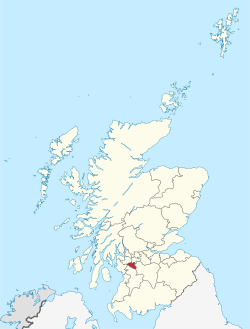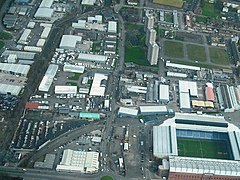Welcome to Visit Pollokshaws Places
The Walkfo guide to things to do & explore in Pollokshaws
![]() Visit Pollokshaws places using Walkfo for free guided tours of the best Pollokshaws places to visit. A unique way to experience Pollokshaws’s places, Walkfo allows you to explore Pollokshaws as you would a museum or art gallery with audio guides.
Visit Pollokshaws places using Walkfo for free guided tours of the best Pollokshaws places to visit. A unique way to experience Pollokshaws’s places, Walkfo allows you to explore Pollokshaws as you would a museum or art gallery with audio guides.
Visiting Pollokshaws Walkfo Preview
Pollokshaws (Scots: Powkshaws) is an area on the South side of Glasgow, Scotland. It is bordered by the residential neighbourhoods of Auldhouse to the east, Eastwood and Hillpark to the south and Shawlands to the north. The White Cart Water flows through the area. When you visit Pollokshaws, Walkfo brings Pollokshaws places to life as you travel by foot, bike, bus or car with a mobile phone & headphones.
Pollokshaws Places Overview: History, Culture & Facts about Pollokshaws
Visit Pollokshaws – Walkfo’s stats for the places to visit
With 164 audio plaques & Pollokshaws places for you to explore in the Pollokshaws area, Walkfo is the world’s largest heritage & history digital plaque provider. The AI continually learns & refines facts about the best Pollokshaws places to visit from travel & tourism authorities (like Wikipedia), converting history into an interactive audio experience.
Pollokshaws history

Pollokshaws was originally a village predominantly dedicated to weaving in the 17th century. A group of Flemish weavers were brought to the area in the 19th century by the Maxwells of Pollok, on account of their exceptional weaving skills. Several residential tower blocks were built as part of the CDA plan in the 1960s. Most of these were later demolished between 2008 and 2016 in the Shawbridge Corridor regeneration.
Pollokshaws landmarks
Pollokshaws Burgh Hall was originally the municipal headquarters of the independent burgh before passing into the ownership of Glasgow Corporation following annexation. Sir John Stirling Maxwell Primary School, located on Bengal Street, is a standalone red sandstone building by architect John H Hamilton and built in 1906-07. The school was closed in June 2011 and despite local pressure and campaigns the building has been allowed to rot.
Why visit Pollokshaws with Walkfo Travel Guide App?
![]() You can visit Pollokshaws places with Walkfo Pollokshaws to hear history at Pollokshaws’s places whilst walking around using the free digital tour app. Walkfo Pollokshaws has 164 places to visit in our interactive Pollokshaws map, with amazing history, culture & travel facts you can explore the same way you would at a museum or art gallery with information audio headset. With Walkfo, you can travel by foot, bike or bus throughout Pollokshaws, being in the moment, without digital distraction or limits to a specific walking route. Our historic audio walks, National Trust interactive audio experiences, digital tour guides for English Heritage locations are available at Pollokshaws places, with a AI tour guide to help you get the best from a visit to Pollokshaws & the surrounding areas.
You can visit Pollokshaws places with Walkfo Pollokshaws to hear history at Pollokshaws’s places whilst walking around using the free digital tour app. Walkfo Pollokshaws has 164 places to visit in our interactive Pollokshaws map, with amazing history, culture & travel facts you can explore the same way you would at a museum or art gallery with information audio headset. With Walkfo, you can travel by foot, bike or bus throughout Pollokshaws, being in the moment, without digital distraction or limits to a specific walking route. Our historic audio walks, National Trust interactive audio experiences, digital tour guides for English Heritage locations are available at Pollokshaws places, with a AI tour guide to help you get the best from a visit to Pollokshaws & the surrounding areas.
“Curated content for millions of locations across the UK, with 164 audio facts unique to Pollokshaws places in an interactive Pollokshaws map you can explore.”
Walkfo: Visit Pollokshaws Places Map
164 tourist, history, culture & geography spots
Pollokshaws historic spots | Pollokshaws tourist destinations | Pollokshaws plaques | Pollokshaws geographic features |
| Walkfo Pollokshaws tourism map key: places to see & visit like National Trust sites, Blue Plaques, English Heritage locations & top tourist destinations in Pollokshaws | |||
Best Pollokshaws places to visit
Pollokshaws has places to explore by foot, bike or bus. Below are a selection of the varied Pollokshaws’s destinations you can visit with additional content available at the Walkfo Pollokshaws’s information audio spots:

Mansewood
Mansewood (Scots: Mansewid) is a residential district in the Scottish city of Glasgow. It is situated south of the River Clyde and is surrounded by the districts of Eastwood, Hillpark, Pollokshaws in Glasgow and Thornliebank and Giffnock.

East Renfrewshire
East Renfrewshire is one of 32 council areas of Scotland . Until 1975, it formed part of the county of Renfreyshire for local government purposes . It was formed in 1996 as a successor to the Eastwood district, with the Levern Valley being annexed .

Muirend
Muirend is situated about 4 miles (6.5 km) south of Glasgow city centre. The G44 postcode was rated as the most desirable area of Scotland to live in. Neighbouring areas include Cathcart, Merrylee and Newlands.

Cathcart Cemetery
Cathcart Cemetery is a cemetery in East Renfrewshire, Scotland, which was opened in 1878 . It is named after the nearby neighbourhood of Cathcart on the southern outskirts of Glasgow, but does not actually fall within the city boundaries .

Strathbungo
Strathbungo grew up as a small village built along the Pollokshaws Road, one of the main arteries leading southwards from the centre of Glasgow, adjoined by the Camphill Estate, now part of Queens Park. The feudal superiors, the Maxwells of Pollok, preferred the name Marchtown, and this name is seen on some old maps.

St Andrew’s Cross, Glasgow
St Andrew’s Cross, also known as Eglinton Toll, is a road junction in the south side of Glasgow, Scotland. The junction is known as the St Andrew Cross.

Tradeston
Tradeston (Scots: Tredstoun) is a small district in the Scottish city of Glasgow adjacent to the city centre on the south bank of the River Clyde.

Moorepark, Glasgow
Moorepark is a small area in the Scottish city of Glasgow. Situated south of the River Clyde and part of the former Burgh of Govan. It was colloquially referred to as ‘Wine Alley’ during the 20th century.

Tradeston Flour Mills explosion
The Tradeston Flour Mills exploded on 9 July 1872. Eighteen people died and at least 16 were injured. The mill was owned by Matthew Muir & Sons and had been in operation for 30 years.
Visit Pollokshaws plaques
![]() 7
7
plaques
here Pollokshaws has 7 physical plaques in tourist plaque schemes for you to explore via Walkfo Pollokshaws plaques audio map when visiting. Plaques like National Heritage’s “Blue Plaques” provide visual geo-markers to highlight points-of-interest at the places where they happened – and Walkfo’s AI has researched additional, deeper content when you visit Pollokshaws using the app. Experience the history of a location when Walkfo local tourist guide app triggers audio close to each Pollokshaws plaque. Explore Plaques & History has a complete list of Hartlepool’s plaques & Hartlepool history plaque map.